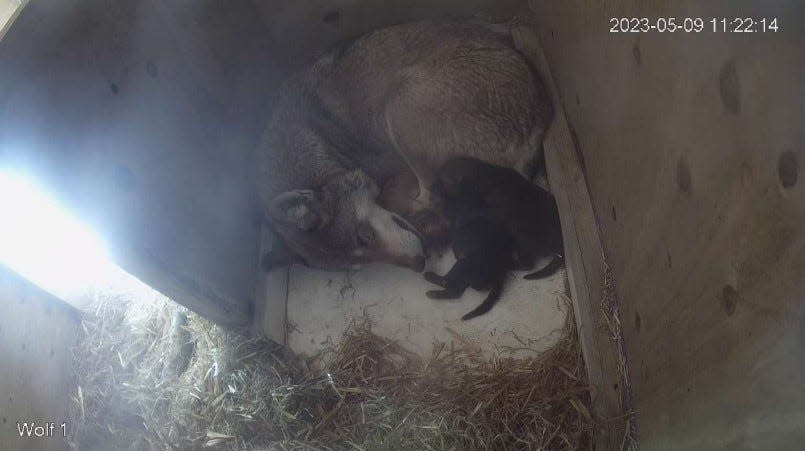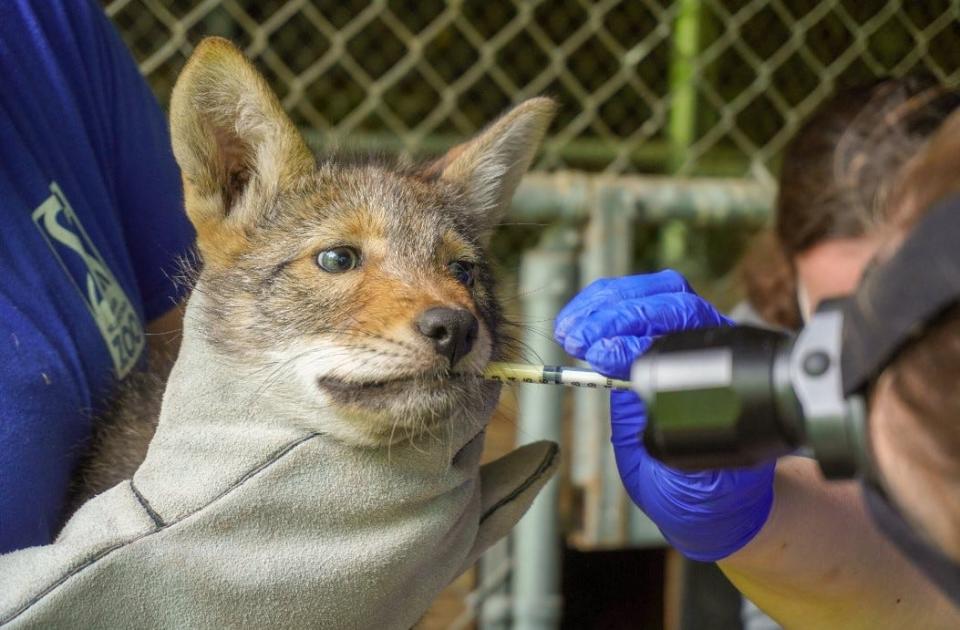Two endangered red wolf pups born at Roger Williams Park Zoo. Here's why it's so important
Two endangered red wolf pups were born at the Roger Williams Park Zoo last month, marking the second year in a row the zoo has celebrated a red-wolf birth, the zoo announced Tuesday.
Born April 29, the two pups are the second litter for Brave, 8, and Diego, 7. Brave gave birth to the pups' sister, Saluda, last May. According to the zoo, Brave and Diego were recommended to breed as part of the Red Wolf Species Survival Plan, a cooperative effort by the Association of Zoos and Aquariums to save the species.
Red wolves are the world's most endangered canid species, according to the zoo. An estimated 23 to 25 red wolves live in the wild, while 278 live in facilities across the country, according to the U.S. Fish and Wildlife Service.

More: Red Wolf born at Roger Williams Park Zoo could be set free, but survival isn't guaranteed
The next month is a "critical time for the pups' development," the zoo said in a press release. Zookeepers and the zoo's veterinary team are monitoring Brave and the pups via an infrared camera in the wolves' birthing den. The pups have been seen nursing and appear to have steadily gained weight, the zoo said.
"The cubs have been staying in the den for the first month as they surpass critical milestones such as nursing, opening their eyes, and gaining strength," the zoo said. "Both pups have already opened their eyes!"
For zoo visitors, spotting the pups could be difficult initially. The pups and their mother are likely to mostly remain in the den, although the pups did take their first steps outside last weekend, the zoo said.
More: Red Wolf born at Roger Williams Park Zoo could be set free, but survival isn't guaranteed
"Guests may be able to catch a glimpse of the pups as they continue to venture outside of the den," the zoo said. "Until then, we encourage folks to follow the Zoo on Facebook and Instagram for updates on the pups progress."
Their father, Diego, should be easier to spot in the wolves' North American habitat, the zoo said. The pups' big sister, Saluda, is showing "a lot of curiosity" toward her siblings but hasn't been seen interacting with them, according to Vick Scharfberg, the zoo's director of marking and public relations.
The pups don't yet have names. The zoo doesn't even know their gender, but that should be revealed when they get their first health check at about seven weeks, Scharfberg said.

Red wolves once populated a large part of the country from Texas to New York, but the species was declared extinct in 1980. To restore the species, zookeepers across the country are breeding the wolves in captivity, and some wolves are being released to wildlife refuges in North Carolina, but the effort has had setbacks.
The wild red wolf population in North Carolina reached a peak of 120 animals in 2012, but the numbers plummeted over the past decade, according to the U.S. Fish and Wildlife Service. Some wolves in the wild have been hit by cars. Others have been mistaken for coyotes and shot. Hybridization with coyotes has also contributed to the decline.
The effort has also celebrated some recent successes. Earlier this month, the Red Wolf Recovery Program announced a litter of three females and two males born in April at the Alligator River Wildlife Refuge in North Carolina. It was the second year in a row the two adult wolves added to their pack.
"Because of this Red Wolf pair's proven ability to care for and nurture a lively bunch of pups, the Red Wolf Recovery Program fostered a male pup born at Point Defiance Zoo and Aquarium in Tacoma, Washington, into this wild litter a few weeks after their birth, bringing this brood to a total of 6 pups!," the Red Wolf Recovery Program said on Facebook.
"With family bonds that are amazingly strong, the 5 siblings from the 2022 litter will help the parents with the raising and bonding of this new group of red wolves," the post said.
This article originally appeared on The Providence Journal: Pair of endangered red wolf pups born at Roger Williams Park Zoo

